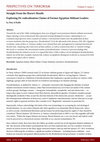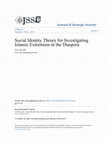Papers by Dina Al Raffie (Huehn)

The Arab Republic of Egypt has a long history of battling jihadism in the region, and as such pre... more The Arab Republic of Egypt has a long history of battling jihadism in the region, and as such presents an interesting case study of counter-terrorism (CT) practices in a non-Western setting. Contrary to the conventional wisdom that reduces the Egyptian state's response to the indiscriminate use of repressive measures, the current case study offers a more nuanced analysis of Egyptian state responses to terrorism that spans the country's history since its independence. Despite repressive measures constituting the backbone of Egyptian state responses to terrorism, their use is much more strategic than is often implied in the literature. As this chapter demonstrates, a comprehensive CT approach including select soft measures does exist in Egypt, albeit with the goal of maintaining regime interests, as opposed to necessarily eliminating the phenomenon. The analysis presented here suggests a symbiosis of regime longevity and existence of an extremist opposition, and that a strategy of extremism in moderation is perhaps the most prominent, underlying strategic trend that is observed across Egyptian CT state practices over the past six decades.
Many scholars of political violence are by now aware of the role identity plays in radicalization... more Many scholars of political violence are by now aware of the role identity plays in radicalization, regardless of whether radicalization leads to violence. An overview of mainstream models of radicalization also shows that identity dynamics lie at the heart of the process.This essay provides an overview of how identity relates to Islamist-inspired radicalization. The aim here is twofold. First, the essay highlights issues relevant to the identity-radicalization debate, and their relation to extremism. Then, drawing from this discussion, it develops a number of points to consider for those considering developing community-based rehabilitation and de-radicalization initiatives. The essay refers primarily to Western democratic contexts, and by no means covers the scope of the discussion on radicalization.

Towards the end of the 1990s, leading figures from two of Egypt’s most prominent Islamist militan... more Towards the end of the 1990s, leading figures from two of Egypt’s most prominent Islamist militant movements began releasing a series of documents that expressed seeming ideological revisions, culminating in a re-evaluation of perspectives and a cessation of violence. Conventional wisdom since the publication of these revisions maintains that the groups have “deradicalized”.[1] In the aftermath of the January 25th, 2011 Egyptian revolution, many of these re-visionary authors were released from jail, and appeared on national television for the first time. Analyzing select interviews of these authors, as well as content from their re-visionist writings, this article re-examines the conventional wisdom of deradicalization. Contrary to previous findings that deradicalization has indeed occurred, it is argued that there is little evidence of real ideological deradicalization. Indeed, two of the four examples cited provide evidence of significant ideological recidivism as measured by both implict and explicit calls to violence.

An overview of literature on radicalization in the Muslim diaspora in Europe finds identity crise... more An overview of literature on radicalization in the Muslim diaspora in Europe finds identity crises to be a key precipitant to the process. Studies also typically focus on the manipulation of identify by violent Islamic extremist groups. This paper attempts to contribute to the discussion on the role of identity in radicalization by using social identity theory. In doing so, the article explores the formation and transformation process of social identities, and argues that the nature of community-level groups and networks may contribute to identity ‘readiness’ for radicalization. To this end, special focus is given to formally recognized Islamist non-governmental organizations (NGOs) and institutions and their potential impact on Muslim religious identity in the European Muslim diaspora. Findings suggest that the more pervasive the ideology of Islamist representatives is, the more likely the normative environment in the diaspora is to be conducive to both non-violent and violent Islamic extremism.
Since the advent of the Global War on Terror, the world has witnessed the continuation of terrori... more Since the advent of the Global War on Terror, the world has witnessed the continuation of terrorist activity under the banner of Salafi Jihad. With military action proving insufficient to defeat the propagators of the ideology, attention has turned to the ideology itself. Understanding the narratives that constitute this ideology and the systems in place that help propagate it is crucial to defeating it. Analysis brings to light elements that arguably constitute a Jihadist master narrative as well as support structures that help perpetuate key underlying messages of this master narrative. Successful counter-narratives should focus on rolling back and containing Jihadist narratives whilst simultaneously highlighting the values and attitudes of democratic, free societies
Books by Dina Al Raffie (Huehn)

The chapter tries to highlight the critical importance of values to leadership, and argues that t... more The chapter tries to highlight the critical importance of values to leadership, and argues that the research design of the ‘social scientific’ mainstream is incommensurable with the language of the scientific discipline that studies values: moral philosophy. The chapter shows that (a) through goals and actions, ethics is a central aspect of leadership and (b) that ethics cannot be reinterpreted as being ‘value-neutral’. Therefore, ‘effective’ leadership must always be connected to a specific value set. After arguing that leadership cannot be meaningfully looked at without reference to virtue ethics, two case studies are used to demonstrate the relationship between the two. By looking at two prominent terrorist leaders, the chapter shows how values are at the heart of their visions and actions. There are at least two practical implications: the study of leadership, and leadership education, must be reconnected with moral philosophy. The chapter connects three hitherto unconnected topics: leadership, (virtue) ethics and terrorism, presenting new insights into especially leadership.
Uploads
Papers by Dina Al Raffie (Huehn)
Books by Dina Al Raffie (Huehn)